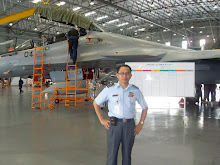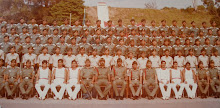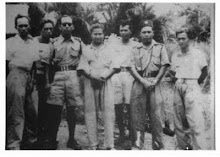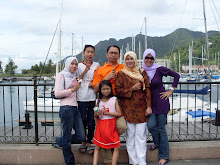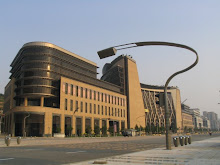
TUN DATO' SERI DR MAHATHIR BIN MOHAMMAD
DK(Joh) DK(Perlis) DK(Kel) DK(Ked) DK(Sel) DKNS DUK SMN SSAP SPCM SSMT SPNS SPMJ SPMS DSBS DUNM DUPN SPDK DP DSDK PIS
MY NOTE
MY NOTE
"YOU MAY FIND A LOT OF ARTICLES AND PICTURES ABOUT MAHATHIR IN THE MAGAZINES, JOURNAL, WEBSITES, BLOGS, NEWSPAPERS ETC. INSIDE HERE, ALL THE ARTICLES WERE CUT AND PASTED. IN ADDITIONS I WILL WRITE (IN MY ON WAY) ABOUT MAHATHIR BASED ON MY OWN POINT OF VIEWS"
my view "THE BIGGEST CONTRIBUTION OF MAHATHIR TO MALAYSIA IS THE DISMISSAL OF ANWAR IBRAHIM FROM HIS POSITION AS DPM IN 1998"
my view "THE BIGGEST CONTRIBUTION OF MAHATHIR TO MALAYSIA IS THE DISMISSAL OF ANWAR IBRAHIM FROM HIS POSITION AS DPM IN 1998"

SYNOPSIS
Mahathir bin Mohamad, (born 20 Dec 1925). Malaysian political leader. A doctor by training, he first entered parliament in 1964 and rose in the United Malays National Organization (UMNO), but lost his seat and was expelled from UMNO in 1969 after criticizing Prime Minister Tunku Abdul Rahman. Subsequently readmitted into UMNO, he was reelected to parliament in 1974 and held several ministerial posts in the 1970s, including Deputy Prime Minister beginning in 1976. Prime minister of a UMNO-led National Front coalition government after 1981, Mahathir sought to make Malaysia an industrial nation and develop Malay businesses, and promoted non individualistic "Asian values" while often denouncing the West. Although Malaysia made enormous and rapid economic progress under Mahathir, political stability was maintained by not tolerating dissent and restricting political freedoms, and his government was denounced for human-rights abuses. He retired as Prime Minister in 2003. Out of office he has continued to be outspoken and sometimes critical of the Malaysian government.
Summary:
Summary:
Expelled from UMNO : 1969
Rejoined UMNO : 1972
Appointed a Senator: 1973
Elected MP and Minister of Education: 1974
Appointed as DPM: 1976
Appointed as PM: 1981
What 'BIG CHANGES' he had done for the country, within 22 years as a PM?
- Synchronised National Time (1981)
- KL international Airport, Sepang (KLIA) (1990-1998)
- Petronas Twin Tower (1992-98)- world tallest twin tower, world tallest building 1998-2004)- 451.9m and 88 stories.
- North-South Highway (JB to Bukit Kayu Hitam)
- Jambatan Pulau Pinang (launched 1985)
- Pelabuhan Tanjung Pelepas, Johor (PTP)
- Langkawi International Maritime and Aerospace Exhibition (LIMA) (1991)
- National Car:Proton Saga (1985)
- Multimedia Super Corridor (MSC)
- Putrajaya (Goverment Administrative Center)(1995-2001) development ongoing.
- Cyberjaya
- Sepang International Circuit (SIC)
- Bakun Dam (1994-2010)
- FT Labuan (16 Apr 1984)
- FT Putrajaya (1 Feb 2001)
Other Mahathir's Legacy:
- Changed the Sultan Johore into normal human being
- Amendment to the Malaysian constitution (the immunity of the Rulers)
- Dismissed Anwar from the next step to the Premier seat.
- Interfered judicial affairs
- Dollar pegging 1998
- The champion and idola of third world countries (SID/LID, CHOGM, NAM, OIC)
He had 3 DPMs throughout his tenure as PM:
- Dato' Musa Hitam (born in Johor Bahru: 18 Apr 1934- became DPM: 1981 and resigned in 1986, now Tun)
- Encik Ghaffar Baba (born in Melaka: 18 Feb 1925, appointed DPM: 1986, defeated by Anwar in party election 1993- died in 23 Apr 2006, Tun)
- Anwar Ibrahim (born in Permatang Pauh, PP: 10 Aug 1947, appointed as DPM dismissed on 2 Sep 1998)
- Abdullah Ahmad (born in Penang: 26 Nov 1939, appointed as DPM: Jan 1999 and succeeded Mahathir as PM on 31 Oct 2003)

The wooden attap house was bought by Mohamad Iskandar when he wanted to marry off his children. It was built in 1900. When he bought the house, the house has only one room with no electricity. It has wooden flooring and the ceiling was made from white cloth. Mahathir was born here on 20th December 1925. He lives there until he was married and moved to his own house in Titi Gajah. Even then Mahathir will always commute to this house to visit his mother.
A visit to Mahathir Mohamad's birth place will give you a different perspective of the life of this revered leader. He was born in Alor Star on Dec 20, 1925 at No 18 Lorong Kilang Ais, off Jalan Pegawai. His home has seen been designated a historical building and was restored by the National Archives in 1992.
SHORT BIOGRAPHY
Born on 20 December 1925 in Alor Setar, the capital of the State of Kedah, Tun Dr. Mahathir did his early and secondary education in his home town. In 1947, he gained admission into the King Edward VII College of Medicine in Singapore.
Upon graduation, he joined the Malaysian government service as a Medical Officer. He left in 1957 to set up his own practice in Alor Setar.
Tun Dr. Mahathir has been active in politics since 1945. He has been a member of the United Malays National Organisation (UMNO) since its inception in 1946.
He was first elected as a Member of Parliament following the General Elections in 1964. However, he lost his seat in the subsequent General Election in 1969. Owing to his keen interest in the country's education, he was appointed Chairman of the first Higher Education Council in 1968, Member of the Higher Education Advisory Council in 1972, Member of the University Court and University of Malaya Council, and Chairman of the National University Council in 1974.
In 1973, Tun Dr. Mahathir was appointed a Senator. He relinquished this post in order to contest in the 1974 General Elections where he was returned unopposed. Following the elections, Tun Dr. Mahathir was appointed the Minister of Education.
In 1976, Tun Dr. Mahathir was made Deputy Prime Minister in addition to his Education portfolio. In a Cabinet reshuffle two years later, he relinquished the Education portfolio for that of Trade and Industry. As Minister of Trade and Industry, he led several investment promotion missions overseas. Tun Dr. Mahathir was elected as one of the three Vice Presidents of UMNO in 1975. In 1978, he won the Deputy President seat and in 1981, he was appointed President of the party. He was returned unopposed as President in 1984.
In the 1987 party elections, Tun Dr. Mahathir defeated his challenger to retain the Presidency and in 1990 and 1993, he was again returned unopposed as party President. Under his leadership, the ruling party Barisan Nasional (National Front) won landslide victories in the 1982, 1986, 1990, 1995 and 1999 General Elections.
Tun Dr. Mahathir is married to a doctor, Tun Dr. Siti Hasmah bt Mohd Ali, and they have seven children Marina, Mirzan, Melinda, Mokhzani, Mukhriz, Maizura and Mazhar.

Tun Dr. Mahathir stepped down as Prime Minister on October 31st 2003 and succeeded by Datuk Seri Abdullah Badawi.
 Tearing Moment: Immidiately after Mahathir announcing his intention to resign as the UMNO President
Tearing Moment: Immidiately after Mahathir announcing his intention to resign as the UMNO President
and Prime Minister of Malaysia (in UMNO General Assembly 2002)
Major Constitutional Changes. In 1983 and 1991, he took on the federal and state monarchies, removing the royal Veto and royal immunity from prosecution. Prior to this amendment of the law, royal assent was required in order for any bill to pass into law. With effect of this amendment, approval by Parliament could be legally considered as royal assent after a period of 30 days, notwithstanding the views of the monarchs.
In 1988 when the future of the ruling party UMNO was about to be decided in the Supreme Court (it had just been de-registered as an illegal society in the High Court), he was believed to have engineered the dismissal of the Lord President of the Supreme Court, Salleh Abas, and three other supreme court justices who tried to block the misconduct hearings. The series of incidents in 1988 has been widely viewed as the end of the Malaysian judiciary's independence from the executive.
Economic Policies. During his term in office, Mahathir turned Malaysia into a regional high-tech manufacturing, financial and telecommunications hub through his economic policies based on corporate nationalis, known as the various "Malaysia Plans" which set out the government middle-term objectives.
These policies with strong Keynesian tendency remained in effect almost to the end of his tenure in office.His pet projects have included Perwaja Steel, an attempt to emulate South Korea and Japan, the Proton car company and ASTRO, a satellite television service.
Mahathir credited with spearheading the phenomenal growth of the Malaysian economy, now one of the largest in South East Asia. Growth between 1988 and 1997 averaged over ten percent and living standards rose twentyfold, with poverty relatively almost eradicated and social indicators such as literacy levels and infant mortality rates becoming almost on par with developed countries.
During this period, Mahathir embarked on various large scale national projects, such as the North-South Expressway, MSC, the planned capital city of Putrajaya, Johor's PTP, KLIA, Bakun Dam and the PETRONAS Twin Towers. While such projects have their benefits, corresponding high costs have made some Malaysians reluctant to engage in more of such ventures, believing that the money can be better spent on other areas of development. On the other hand, Mahathir has always argued that such projects yield a direct return to the economy, apart from just serving the national pride, as government spendings in turn create jobs along with other multiplier effects.
Mahathir has also been criticised for the failures and inefficiency of some of his pet projects. Perwaja Steel eventually failed and had to be rescued by a corporate white knight. Its chairman, Eric Chia, faced charges of corruption in 2004. Proton eventually had to be bought by PETRONAS when its parent DRB-HICOM found itself over-extended, and is still currently fighting to become profitable. Astro enjoyed a monopoly on pay television services in Malaysia until 2005 when it ended with the granting of a licence to a rival MiTV.
The Bakun Dam project was to be managed by a local construction firm, Ekran Berhad. It issued a 1-for-1 on time right issue which was 63% undersubscribed (the first time in Malaysia for an event of this magnitude). Ekran's chairman, Ting Pek King, had to purchase all unsubscribed shares at a cost of RM500 million due to his agreement with the underwriters. Subsequently the dam project was taken back by the government which was obliged to pay Ekran for the work already completed.
1997 Asian Financial Crisis. During the Asian financial crisis of 1997, IMF had prescribed a recovery package for Malaysia, but Mahathir defied international pressure, his then Deputy Anwar Ibrahim, and conventional wisdom in rejecting the package. Though economic prosperity has been mixed since then, Mahathir argued that Malaysia's recovery was relatively faster and better, as compared to many other Asian countries affected.
After the financial crisis, the IMF and World Bank acknowledged that Mahathir's approach had worked. During Mahathir's administration, there are a few speculation activities made by the administration which caused losses for Malaysia. Between 1981 and 1982, Malaysian businesses became involved in the international tin venture. The activity caused the price of the commodity to skyrocket, resulting in the collapse of the export market for tin. This venture cost Malaysia USD80 million or RM209 million in losses.
In 1990, Bank Negara became involved in the Pound Sterling speculation. The speculation activity failed and costs the central bank USD4 billion. In 1994, the bank continued to pursue the speculation activity and further lost USD 2.2 billion. Finally, in 1994, the central bank technically become insolvent and was bailed out by the Ministry of Finance.
Sacking of Anwar Ibrahim. In 1998, the government brought charges of sexual misconduct and abuse of power charges against the former finance minister and deputy prime minister, Anwar Ibrahim. Anwar claimed that he was being set up because he had tried to turn corruption and nepotism into major political issues, with Mahathir and his associates as the targets. Mahathir's supporters believe that it was Anwar's attempt to replace Mahathir as the Prime Minister, upon seeing the downfall of Indonesia's Soeharto, that has led him to be removed from politics altogether.
The government included the statements of the purported victims of Anwar's sexual assaults, evidence that was alleged by some to be tainted. Furthermore, the prosecution was unable to accurately decide on a date that the alleged acts of anal sex had occurred - the government originally alleged that a sodomy had occurred inside a building that had not been constructed at the time of the alleged event. When the anomaly was pointed out, the prosecution amended the date of the alleged acts to a date after the building was built. Mahathir himself went as far as to go on television to declare Anwar guilty of sodomy and homosexual acts, even as the trial still was underway.
There was widespread condemnation of the trial from human rights groups and the Malaysia bar association, who expressed serious doubts about its fairness. Mahathir then ordered a crackdown on the media and opposition parties who protested the trial. Anwar Ibrahim was sentenced to six years in prison for corruption and nine years prison for sodomy, to be served consecutively.
The Anwar crisis sparked protests by many Malaysians, of all ethnic groups, and Anwar's supporters formed "Parti Keadilan Nasional" (National Justice Party) or "KeADILan". It garnered widespread support from Malaysians, but it managed to win only five parliamentary seats in the 1999 election. In the subsequent 2004 elections, when Mahathir's successor became Prime Minister, KeADILan was nearly wiped out, with Anwar's wife Wan Azizah winning its sole parliamentary seat. Six months later, Anwar's conviction was overturned and he was released. Mahathir criticized the release of Anwar.
The 2008 elections showed a major comeback from the opposition parties with Anwar's KeADILan party helping to form five state governments, as well as becoming the biggest opposition party in Parliament.
Upon graduation, he joined the Malaysian government service as a Medical Officer. He left in 1957 to set up his own practice in Alor Setar.
Tun Dr. Mahathir has been active in politics since 1945. He has been a member of the United Malays National Organisation (UMNO) since its inception in 1946.
He was first elected as a Member of Parliament following the General Elections in 1964. However, he lost his seat in the subsequent General Election in 1969. Owing to his keen interest in the country's education, he was appointed Chairman of the first Higher Education Council in 1968, Member of the Higher Education Advisory Council in 1972, Member of the University Court and University of Malaya Council, and Chairman of the National University Council in 1974.
In 1973, Tun Dr. Mahathir was appointed a Senator. He relinquished this post in order to contest in the 1974 General Elections where he was returned unopposed. Following the elections, Tun Dr. Mahathir was appointed the Minister of Education.
In 1976, Tun Dr. Mahathir was made Deputy Prime Minister in addition to his Education portfolio. In a Cabinet reshuffle two years later, he relinquished the Education portfolio for that of Trade and Industry. As Minister of Trade and Industry, he led several investment promotion missions overseas. Tun Dr. Mahathir was elected as one of the three Vice Presidents of UMNO in 1975. In 1978, he won the Deputy President seat and in 1981, he was appointed President of the party. He was returned unopposed as President in 1984.
In the 1987 party elections, Tun Dr. Mahathir defeated his challenger to retain the Presidency and in 1990 and 1993, he was again returned unopposed as party President. Under his leadership, the ruling party Barisan Nasional (National Front) won landslide victories in the 1982, 1986, 1990, 1995 and 1999 General Elections.
Tun Dr. Mahathir is married to a doctor, Tun Dr. Siti Hasmah bt Mohd Ali, and they have seven children Marina, Mirzan, Melinda, Mokhzani, Mukhriz, Maizura and Mazhar.

Mahathir and his extended family
Tun Dr. Mahathir stepped down as Prime Minister on October 31st 2003 and succeeded by Datuk Seri Abdullah Badawi.
 Tearing Moment: Immidiately after Mahathir announcing his intention to resign as the UMNO President
Tearing Moment: Immidiately after Mahathir announcing his intention to resign as the UMNO Presidentand Prime Minister of Malaysia (in UMNO General Assembly 2002)
Issues and Controversies
Major Constitutional Changes. In 1983 and 1991, he took on the federal and state monarchies, removing the royal Veto and royal immunity from prosecution. Prior to this amendment of the law, royal assent was required in order for any bill to pass into law. With effect of this amendment, approval by Parliament could be legally considered as royal assent after a period of 30 days, notwithstanding the views of the monarchs.
In 1988 when the future of the ruling party UMNO was about to be decided in the Supreme Court (it had just been de-registered as an illegal society in the High Court), he was believed to have engineered the dismissal of the Lord President of the Supreme Court, Salleh Abas, and three other supreme court justices who tried to block the misconduct hearings. The series of incidents in 1988 has been widely viewed as the end of the Malaysian judiciary's independence from the executive.
Economic Policies. During his term in office, Mahathir turned Malaysia into a regional high-tech manufacturing, financial and telecommunications hub through his economic policies based on corporate nationalis, known as the various "Malaysia Plans" which set out the government middle-term objectives.
These policies with strong Keynesian tendency remained in effect almost to the end of his tenure in office.His pet projects have included Perwaja Steel, an attempt to emulate South Korea and Japan, the Proton car company and ASTRO, a satellite television service.
Mahathir credited with spearheading the phenomenal growth of the Malaysian economy, now one of the largest in South East Asia. Growth between 1988 and 1997 averaged over ten percent and living standards rose twentyfold, with poverty relatively almost eradicated and social indicators such as literacy levels and infant mortality rates becoming almost on par with developed countries.
During this period, Mahathir embarked on various large scale national projects, such as the North-South Expressway, MSC, the planned capital city of Putrajaya, Johor's PTP, KLIA, Bakun Dam and the PETRONAS Twin Towers. While such projects have their benefits, corresponding high costs have made some Malaysians reluctant to engage in more of such ventures, believing that the money can be better spent on other areas of development. On the other hand, Mahathir has always argued that such projects yield a direct return to the economy, apart from just serving the national pride, as government spendings in turn create jobs along with other multiplier effects.
Mahathir has also been criticised for the failures and inefficiency of some of his pet projects. Perwaja Steel eventually failed and had to be rescued by a corporate white knight. Its chairman, Eric Chia, faced charges of corruption in 2004. Proton eventually had to be bought by PETRONAS when its parent DRB-HICOM found itself over-extended, and is still currently fighting to become profitable. Astro enjoyed a monopoly on pay television services in Malaysia until 2005 when it ended with the granting of a licence to a rival MiTV.
The Bakun Dam project was to be managed by a local construction firm, Ekran Berhad. It issued a 1-for-1 on time right issue which was 63% undersubscribed (the first time in Malaysia for an event of this magnitude). Ekran's chairman, Ting Pek King, had to purchase all unsubscribed shares at a cost of RM500 million due to his agreement with the underwriters. Subsequently the dam project was taken back by the government which was obliged to pay Ekran for the work already completed.
1997 Asian Financial Crisis. During the Asian financial crisis of 1997, IMF had prescribed a recovery package for Malaysia, but Mahathir defied international pressure, his then Deputy Anwar Ibrahim, and conventional wisdom in rejecting the package. Though economic prosperity has been mixed since then, Mahathir argued that Malaysia's recovery was relatively faster and better, as compared to many other Asian countries affected.
After the financial crisis, the IMF and World Bank acknowledged that Mahathir's approach had worked. During Mahathir's administration, there are a few speculation activities made by the administration which caused losses for Malaysia. Between 1981 and 1982, Malaysian businesses became involved in the international tin venture. The activity caused the price of the commodity to skyrocket, resulting in the collapse of the export market for tin. This venture cost Malaysia USD80 million or RM209 million in losses.
In 1990, Bank Negara became involved in the Pound Sterling speculation. The speculation activity failed and costs the central bank USD4 billion. In 1994, the bank continued to pursue the speculation activity and further lost USD 2.2 billion. Finally, in 1994, the central bank technically become insolvent and was bailed out by the Ministry of Finance.
Sacking of Anwar Ibrahim. In 1998, the government brought charges of sexual misconduct and abuse of power charges against the former finance minister and deputy prime minister, Anwar Ibrahim. Anwar claimed that he was being set up because he had tried to turn corruption and nepotism into major political issues, with Mahathir and his associates as the targets. Mahathir's supporters believe that it was Anwar's attempt to replace Mahathir as the Prime Minister, upon seeing the downfall of Indonesia's Soeharto, that has led him to be removed from politics altogether.
The government included the statements of the purported victims of Anwar's sexual assaults, evidence that was alleged by some to be tainted. Furthermore, the prosecution was unable to accurately decide on a date that the alleged acts of anal sex had occurred - the government originally alleged that a sodomy had occurred inside a building that had not been constructed at the time of the alleged event. When the anomaly was pointed out, the prosecution amended the date of the alleged acts to a date after the building was built. Mahathir himself went as far as to go on television to declare Anwar guilty of sodomy and homosexual acts, even as the trial still was underway.
There was widespread condemnation of the trial from human rights groups and the Malaysia bar association, who expressed serious doubts about its fairness. Mahathir then ordered a crackdown on the media and opposition parties who protested the trial. Anwar Ibrahim was sentenced to six years in prison for corruption and nine years prison for sodomy, to be served consecutively.
The Anwar crisis sparked protests by many Malaysians, of all ethnic groups, and Anwar's supporters formed "Parti Keadilan Nasional" (National Justice Party) or "KeADILan". It garnered widespread support from Malaysians, but it managed to win only five parliamentary seats in the 1999 election. In the subsequent 2004 elections, when Mahathir's successor became Prime Minister, KeADILan was nearly wiped out, with Anwar's wife Wan Azizah winning its sole parliamentary seat. Six months later, Anwar's conviction was overturned and he was released. Mahathir criticized the release of Anwar.
The 2008 elections showed a major comeback from the opposition parties with Anwar's KeADILan party helping to form five state governments, as well as becoming the biggest opposition party in Parliament.
xxxxxxxxxxxxxxxxxxxxxxxxxxxxxx




















